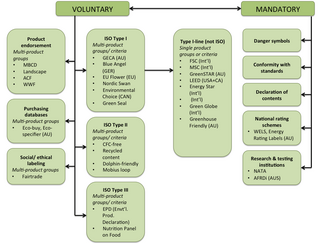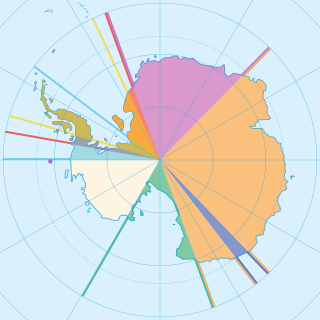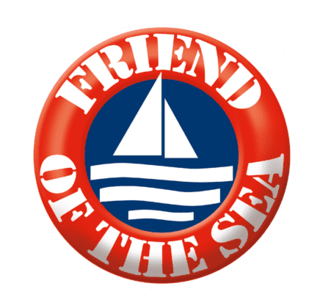
The Antarctic Treaty and related agreements, collectively known as the Antarctic Treaty System (ATS), regulate international relations with respect to Antarctica, Earth's only continent without a native human population. It was the first arms control agreement established during the Cold War, designating the continent as a scientific preserve, establishing freedom of scientific investigation, and banning military activity; for the purposes of the treaty system, Antarctica is defined as all the land and ice shelves south of 60°S latitude. Since September 2004, the Antarctic Treaty Secretariat, which implements the treaty system, is headquartered in Buenos Aires, Argentina.
The Protocol on Environmental Protection to the Antarctic Treaty, also known as the Madrid Protocol, is a complementary legal instrument to the Antarctic Treaty signed in Madrid on 4 October 1991. It entered into force on 14 January 1998.
Environment and Climate Change Canada is the department of the Government of Canada responsible for coordinating environmental policies and programs, as well as preserving and enhancing the natural environment and renewable resources. It is also colloquially known by its former name, Environment Canada.

The Agreed Measures for the Conservation of Antarctic Fauna and Flora is a set of environmental protection measures which were accepted at the third Antarctic Treaty Consultative Meeting in Brussels in 1964. The Agreed Measures were formally in force as part of the Antarctic Treaty System from 1982 to 2011, when they were withdrawn as the principles were now entirely superseded by later agreements such as the 1991 Protocol on Environmental Protection to the Antarctic Treaty. The Agreed Measures were adopted in order to further international collaboration within the administration of the Antarctic Treaty System and promote the protection of natural Antarctic ecological systems while enabling scientific study and exploration.
Forest & Bird, also known by its formal name as the Royal Forest and Bird Protection Society of New Zealand, is an environmental organisation specialising in the protection and conservation of New Zealand's indigenous flora and fauna and unique wild places and natural ecosystems. Forest & Bird consists of 47 branches located in urban and rural centres throughout New Zealand. Branches are actively engaged in conservation projects and advocacy on a community, regional and national basis. Forest & Bird has offices and staff located in Auckland, Christchurch, Wellington, Nelson and Dunedin. Forest & Bird publishes a quarterly magazine Forest & Bird, one of New Zealand's definitive natural history and conservation publications.
This is a timeline of environmental history of New Zealand. It includes notable events affecting the natural environment of New Zealand as a result of human activity.

The Marine Stewardship Council (MSC) is a non-profit organisation which aims to set standards for sustainable fishing. Fisheries that wish to demonstrate they are well-managed and sustainable compared to the MSC's standards are assessed by a team of Conformity Assessment Bodies (CABs).

Ecolabels and Green Stickers are labeling systems for food and consumer products. The use of ecolabels is voluntary, whereas green stickers are mandated by law; for example, in North America major appliances and automobiles use Energy Star. They are a form of sustainability measurement directed at consumers, intended to make it easy to take environmental concerns into account when shopping. Some labels quantify pollution or energy consumption by way of index scores or units of measurement, while others assert compliance with a set of practices or minimum requirements for sustainability or reduction of harm to the environment. Many ecolabels are focused on minimising the negative ecological impacts of primary production or resource extraction in a given sector or commodity through a set of good practices that are captured in a sustainability standard. Through a verification process, usually referred to as "certification", a farm, forest, fishery, or mine can show that it complies with a standard and earn the right to sell its products as certified through the supply chain, often resulting in a consumer-facing ecolabel.
The Global Ecolabelling Network (GEN) is a non-profit network composed of some 29 ecolabel organisations throughout the world representing nearly 60 countries and territories, with two associate members and a growing number of affiliate members, one of which is Google. GEN members have certified over 252,000 products and services for environmental leadership. GEN was established in 1994.

Colonization of Antarctica is the establishing and maintaining of control over Antarctic land for exploitation and possibly settlement.

Robert Charles Swan, OBE, FRGS is the first person to walk to both poles.

The Antarctic and Southern Ocean Coalition (ASOC) is a global coalition of environmental non-governmental organizations with more than 150 members in 40 countries worldwide. ASOC has worked since 1978 to ensure that the Antarctic Continent, its surrounding islands and the great Southern Ocean survive as the world's last unspoiled wilderness, a global commons for the heritage of future generations. ASOC is supported entirely through donations from individual supporters around the world, dues from its members and grants from foundations. The Secretariat of the Antarctic and Southern Ocean Coalition (ASOC), which includes 150 organizations in 40 countries, is based in Washington, D.C. The ASOC Council includes member groups that have paid dues or provided significant in-kind services to the ASOC campaign team.
Sustainable seafood is seafood that is caught or farmed in ways that consider the long-term vitality of harvested species and the well-being of the oceans, as well as the livelihoods of fisheries-dependent communities. It was first promoted through the sustainable seafood movement which began in the 1990s. This operation highlights overfishing and environmentally destructive fishing methods. Through a number of initiatives, the movement has increased awareness and raised concerns over the way our seafood is obtained.

As with other countries, New Zealand's 200 nautical miles exclusive economic zone gives its fishing industry special fishing rights. It covers 4.1 million square kilometres. This is the sixth largest zone in the world, and is fourteen times the land area of New Zealand.

Friend of the Sea is a project of the World Sustainability Organization for the certification and promotion of seafood from sustainable fisheries and sustainable aquaculture. It is the only certification scheme which, with the same logo, certifies both wild and farmed seafood.
The natural environment, commonly referred to simply as the environment, includes all living and non-living things occurring naturally on Earth.

Dissostichus, the toothfish, is a genus of marine ray-finned fish belonging to the family Nototheniidae, the notothens or cod icefish. These fish are found in the Southern Hemisphere. Toothfish are marketed in the United States as Chilean sea bass or less frequently as white cod. "Chilean sea bass" is a marketing name coined in 1977 by Lee Lantz, a fish wholesaler who wanted a more attractive name for selling the Patagonian toothfish to Americans. In 1994, the U.S. Food and Drug Administration (FDA) accepted "Chilean sea bass" as an "alternative market name" for Patagonian toothfish. The toothfish was remarkably successful in the United States, Europe and Asia, and earned the nickname "white gold" within the market. Toothfish are vital to the ecological structure of Southern Ocean ecosystems. For this reason, on 4 September a national day is dedicated to the toothfish in South Georgia.

Tourism started in Antarctica by the sea in the 1960s. Air overflights started in the 1970s with sightseeing flights by airliners from Australia and New Zealand, and were resumed in the 1990s. The (summer) tour season lasts from November to March. Most of the estimated 14,762 visitors to Antarctica from 1999–2000 were on sea cruises. During the 2009 to 2010 tourist season, over 37,000 people visited Antarctica.
Tim Stephens is Professor of International Law at the University of Sydney and Fellow of the Australian Academy of Law. Stephens' main areas of research are the international law of the sea and international environmental law.
Claire Christian is the director of the Secretariat of the Antarctic and Southern Ocean Coalition (ASOC) based in Washington, D.C., USA.











